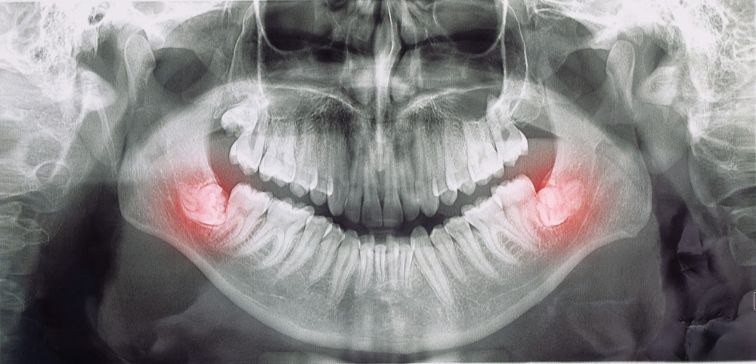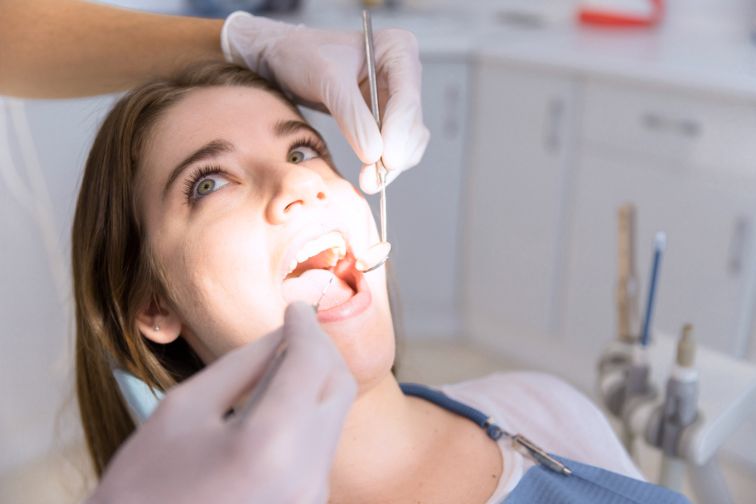
Molar teeth are the teeth at the posterior (back) section of the mouth. Of the 32 permanent teeth, 12 of them are molar teeth, 3 per side on the maxilla (upper jaw) and mandible (lower jaw). They are wider and bigger than the rest of the teeth and are primarily used for grinding food.
Even though molar teeth are bigger and stronger than other teeth, the fact that they are used most often when chewing means that problems can occur more frequently. Pain in the molar teeth isn’t normal and can be the first sign of a range of problems, such as cavities or tooth infections. If you aren’t sure why your molar teeth are hurting, we recommend visiting your dentist.
Symptoms of molar tooth pain can be localized to a single tooth or the pain could surround more molar teeth. Symptoms of molar tooth pain can include:

Tooth Infection
Infection can be a cause of molar tooth pain. Infections usually start around a single tooth. If left untreated, the infection can spread to the surrounding teeth, and even to parts of the airway, which can cause sinusitis. Infections that spread can lead to excessive swelling and pain.
Your tooth could also have an abscess, which is a sign of advanced infection of the tooth. Abscess is filled with a bus and is located around the root of the tooth, just under the gumline.
Treating molar teeth infections can include a root canal or a tooth extraction, and should be done as quickly as possible, to avoid further spreading and pain.
Periodontitis, also known as gum disease or gingivitis in its early stages, can have serious effects on molar teeth. Periodontitis can cause inflammation of the gums, which can make chewing extremely painful, especially if the inflammation is near the wisdom teeth. Extreme cases of periodontitis can cause the gums to erode away, leaving your molars exposed. The teeth become loose, resulting in pain when chewing.
Cavities are holes in the teeth that are made by acid from bacteria that live on teeth. Cavities are usually a result of poor dental hygiene, which means that molar teeth are more likely to get cavities because they are at the back of the mouth, making them harder to clean. When cavities affect a molar tooth, there is often a feeling of sharp pain or throbbing.
The cavities can get infected with bacteria too, causing inflammation inside your tooth. This is called pulpitis and should be treated as soon as possible to avoid permanent damage to the teeth and mouth.
Bacterial infections around the molar teeth that aren’t dealt with can spread to other parts of the mouth and even other parts of the body. The sinuses are the first on the line because they are very close to the upper molars. If you feel head pressure that radiates from your molars, that could be a sign of acute bacterial sinusitis.
Cold and heat sensitivity is probably the most common pain felt when having problems with molar teeth because it can be caused by many things, such as broken teeth, gum disease, old fillings or tooth decay. The teeth become sensitive to hot and cold temperatures when the enamel is worn off. The enamel is the protective layer that coats the surface of the tooth, and when it wears off, layers of the tooth that contain nerves are exposed, in turn causing increased sensitivity. Pain from temperature sensitivity can be relieved with special toothpaste for sensitive teeth.
Cracks can form acutely when biting down on really hard food, or over time because of aging or injury. Pain from a cracked tooth is usually sharp and happens when eating hot or cold foods. Tooth fillings can also crack and cause the same type of pain. If you want to treat a filling or cracked tooth, the only way to go is to see a dentist.
Bruxism, also known as teeth grinding, is a condition where you unconsciously grind your teeth, even when you’re asleep. This condition can wear down enamel very fast, causing increased tooth sensitivity and pain. Symptoms of bruxism can include sore teeth, a sore jaw, trouble opening and closing your mouth and pain while biting.

Home Treatment
Temporary pain relief can be done at home if, for example, you need to wait for an appointment. Treatment at home isn’t a long-term solution though, so be sure to contact your dentist as soon as possible if you have any of the mentioned symptoms.
Here are some ways to deal with molar tooth pain at home:
You should book an appointment with your dentist if you have any of the mentioned symptoms. The dentist will prescribe some of the following treatments:
There are a few ways to help prevent molar tooth pain. It all starts with good dental hygiene, but because of their position in the mouth, molar teeth can be difficult to floss and brush. Brush your teeth at least twice a day, and also floss daily. Altering your diet could also help. Avoid eating extremely hot or cold beverages and sugary foods and drinks. Don’t chew on very hard foods such as ice or popcorn kernels.

